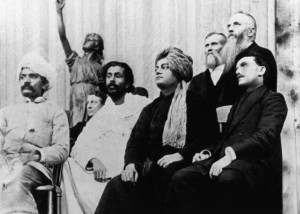
Swami Vivekananda’s speech in World Parliament of Religions, Chicago September 11, 1893
-BY Sudhirkrishna Adiga
Today is the 120th anniversary of the great speech delivered by Swami Vivekananda in the Parliament of World Religions held at Chicago on 11th September 1893 in the United States.

September 11, 1893
He upheld the glory of Sanathana Dharma with his thunderlike sermon and earned the love of Americans thereby opening their eyes to the real essence and the spirit of the time tested way of life as against the negative projection of it in the West by Christian Missionaries. He also enlightened the hindus who felt inferior to other religions because of the impact of age old muslim rule and the subsequent western system of education which pushed them to accept intellectual colonialism. His tireless efforts to make his countrymen realise the spiritual treasure hidden inside the Sanathana Dharma are remarkably outstanding and beyond the comprehension of ordinary people. He resurrected the Sanathana Dharma by spreading awareness about the tenets of Vedas and Upanishads and advocated for the practice of those permanent values which constituted the crux and core of it. Within the short span of 39 years he accomplished so many things that persons with 80+ years of life seldom can even dare to think of. May be that’s why he perfectly matches with the sobriquet “the thunder monk” due to his unshakable conviction towards the mission he undertook and willpower as hard as the rock in Kanyakumari (on which he meditated and realised the spirit of Sanathana Dharma).
But the question now that immediately arises in our mind after contemplating these aspects is; have we paid our gratitude and respect to that great soul in a befitting way? The answer to this haunting question is inevitably in negative. The governments which reigned the country after Independence systematically did their best in drifting the country towards complete anarchy and smothered the ancient values in the name of secularism. The conscious effort by every government to disconnect the chord of sanatanic principles from our academic curriculum is currently resulting in the practice of all evil deeds. There is an acute deficit of ethics in public life more now than anytime in the past. The failure of the current education system to incorporate the sanatanic principles in its curriculum at every phase has created absolute pandemonium. The moral degeneration has almost become a part of the routine of an individual’s life and ultimately affecting the entire system like the growth and spread carcinogenic cells. As the adage goes ‘as you sow so shall you reap’ the impact of the misdeeds of the past governments and public institutions is yielding the bitter fruit. The focus of our rulers more to Artha and nothing to Dharma (ethics) is creating a hedonistic society that will plunge into chaos as W.B.Yeats, an English poet, aptly observed:
Things fall apart; the centre cannot hold;
Mere anarchy is loosed upon the world,
The blood-dimmed tide is loosed, and everywhere
The ceremony of innocence is drowned;
The best lack all conviction, while the worst
Are full of passionate intensity.
We should revisit Swami Vivekananda at least now; well before our doomsday; well before the complete extinction; much prior to the sad experience of listening to the lectures of some enlightened western scholars who come to teach us of our own spirituals values and remind us of the sacred doctrines of the great Sri Ramakrishna Paramahamsa and his dauntless disciple; and finally before the transformation of the country into inferno devoid of humanity. Come, let us think seriously…
The Caption is taken from the Brihadaranyaka Upanishad. The Thunder speaks in The Brihadaranyaka Upanishad, which is considered the most important of the 13 Principal Upanishadscomposing the Vedanta, consists of the three main imperatives from which spring “The Three Principal Virtues” of Hinduism as articulated by the thunder.
Each group the thunder addresses with the monosyllabic “Da” interprets the meaning of the imperative address differently:
The Gods: Datta-Give
Men: Dayadhvam-Sympathize
Demons: Damyata-Control (reflexive here i.e. “control of the self”
The thunder speaks in Sanskrit, the language in which the Rigveda and the Principal Upanishads were written. Here, it serves as a primordial language. It’s the great-grandfather of English as well as most other European languages.
Contact the author at sudhiradiga@gmail.com






